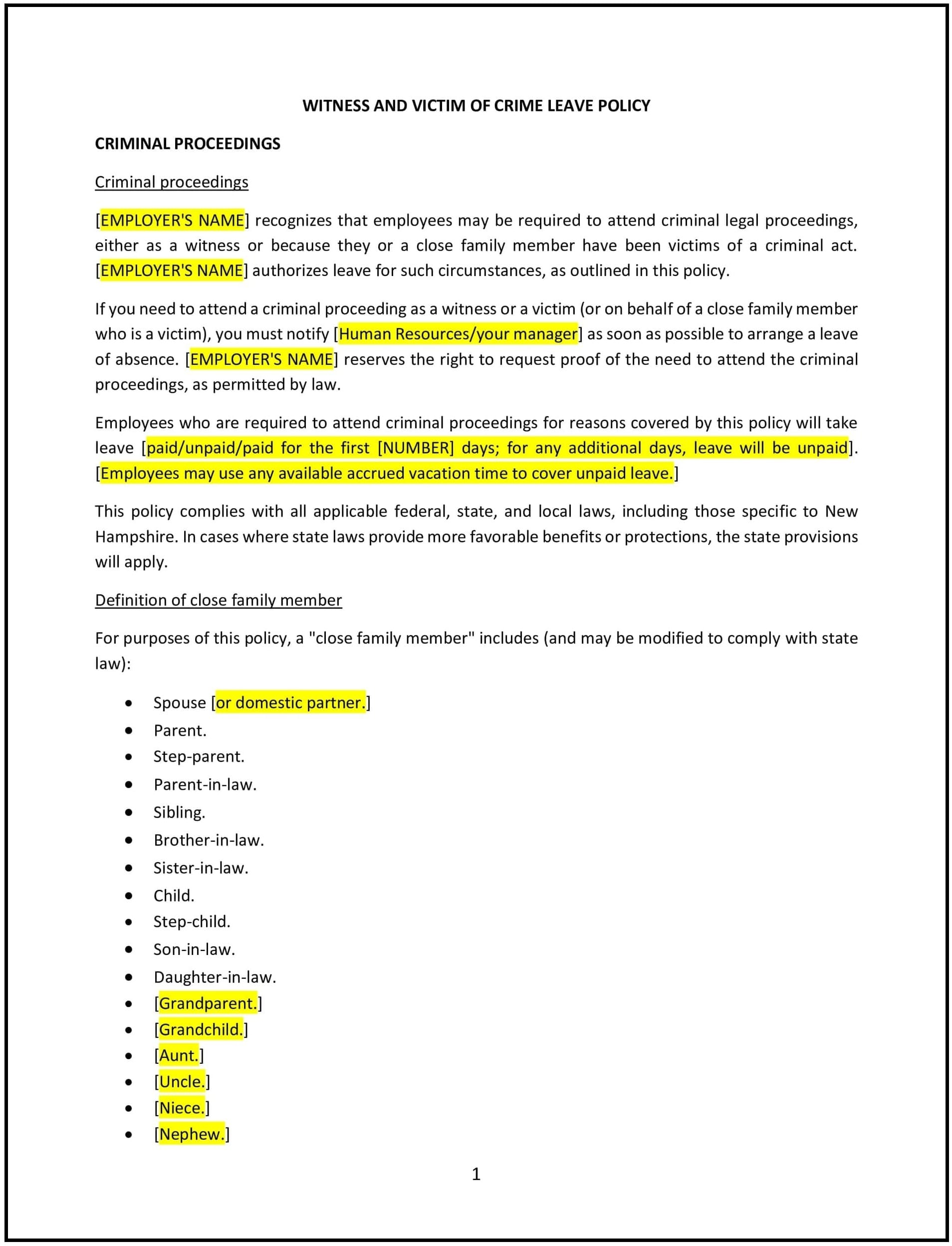Witness and victim of crime leave policy (New Hampshire): Free template
Got contracts to review? While you're here for policies, let Cobrief make contract review effortless—start your free review now.

Customize this template for free
Witness and victim of crime leave policy (New Hampshire)
A witness and victim of crime leave policy helps New Hampshire businesses provide paid or unpaid leave to employees who need time off to serve as witnesses or victims of crime. This policy outlines the conditions under which employees may take leave, the process for requesting time off, and the documentation required to support such requests.
By implementing this policy, businesses can support employees who are impacted by crime, while balancing operational needs and ensuring fairness in the application of leave policies.
How to use this witness and victim of crime leave policy (New Hampshire)
- Define eligibility: Specify the types of crime-related events that qualify for leave, such as being a witness in a criminal trial, being a victim of a crime, or attending legal proceedings related to a crime.
- Specify the duration of leave: Clarify how much leave an employee is entitled to, such as a specific number of days per year, or a set amount of time for each incident. Include provisions for paid or unpaid leave, depending on the company’s policy.
- Outline the process for requesting leave: Describe how employees should request leave, including how far in advance they need to submit requests, and whether they need to provide documentation, such as court subpoenas or police reports.
- Set approval procedures: Identify the person or department responsible for approving crime leave requests, such as a manager, HR, or legal department, and ensure the process is transparent and efficient.
- Address confidentiality: Ensure that any personal or sensitive information related to the leave request is handled confidentially, respecting the employee’s privacy.
- Provide support services: Offer resources to employees affected by crime, such as access to counseling, employee assistance programs (EAP), or legal assistance.
- Include job protection provisions: Clarify that the employee’s job will be protected during the leave period, meaning they will be able to return to their role after their leave ends.
- Review and update: Regularly review the policy to ensure it remains aligned with legal requirements, business needs, and any changes in state laws related to crime-related leave.
Benefits of using this witness and victim of crime leave policy (New Hampshire)
This policy provides several benefits for New Hampshire businesses:
- Supports employee well-being: Offering leave for employees affected by crime demonstrates the company’s commitment to employee well-being and creates a supportive work environment.
- Improves employee retention: Businesses that support employees during difficult times, such as serving as a victim or witness to a crime, foster loyalty and trust, which can lead to higher employee retention.
- Reduces workplace disruptions: By providing clear guidelines for leave, businesses can manage employee absences efficiently, minimizing disruptions to operations while supporting affected employees.
- Enhances legal compliance: A well-documented policy helps businesses ensure that they comply with state and federal laws regarding leave for crime-related matters.
- Promotes a culture of empathy: By recognizing the challenges employees may face when involved in crime-related events, businesses can build a compassionate and empathetic workplace culture.
Tips for using this witness and victim of crime leave policy (New Hampshire)
- Communicate the policy clearly: Ensure that all employees are aware of the policy and understand their rights and responsibilities under it.
- Train HR and managers: HR and managers should be trained on the policy to ensure they handle requests properly and support employees in a sensitive and timely manner.
- Ensure transparency: The approval process for crime-related leave should be transparent, with clear expectations about documentation, timing, and job protection.
- Be sensitive to employee needs: Understand that crime-related leave can be emotionally challenging for employees, and be prepared to offer support and flexibility where appropriate.
- Regularly review the policy: Review the policy at least annually to ensure it is up to date with changes in state laws, business needs, or employee feedback.